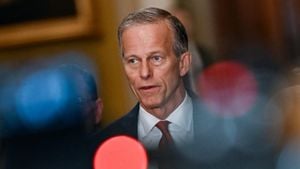The UK’s university system is facing significant challenges as tuition fees rise, impacting students and institutions nationwide.
Universities across the UK are grappling with financial strains, prompting fears of potential cuts and adjustments. Major institutions like Durham University have recently announced measures to counteract rising expenses and declining income. A letter to staff from Vice-Chancellor Prof. Karen O’Brien highlighted alarming statistics: rising national insurance costs adding £5.3 million to operational expenditures coupled with nearly 400 fewer international postgraduate students costing the university about £11.5 million. It's projected these losses will not be compensated by the recently announced hikes to home undergraduate tuition fees, which will increase to £9,535 from £9,250 starting the 2025-26 academic year.
Durham University is not alone; similar institutions, including Newcastle and Northumbria, are also facing severe financial constraints. Amidst these pressures, universities are being forced to make tough decisions. At Durham, the administration has opened applications for voluntary severance and is considering additional cuts on non-essential expenditures, which might include reduced energy usage, slowed building projects, and limitations on travel expenditures.
Statistics show Durham University has managed to recruit more home and international students compared to last year, which is positive. Still, as university officials pointed out, the broader issues facing the higher education sector will not magically vanish due to the increase in fees. “While we have succeeded in growing and diversifying income, our costs have also increased,” stated Prof. O’Brien.
Yet, not all responses are passive. Student activists and organizations are rallying against the tuition hike. The 'Funding Not Fees' campaign, led by Socialist Students, seeks to challenge the increasing financial burden on students. This campaign highlights the struggles faced by students already battling the cost-of-living crisis, emphasizing the need for full funding for education and meaningful financial support.
Adam Gillman, youth organizer for the Socialist Party, pointed out the broader concerns among students. He noted, “Many students are outraged. This increase isn’t just on new students; it also affects those already enrolled.” Activists argue it’s unjust, especially for graduates entering the workforce at low-paying jobs who still must begin repaying their education debt regardless of their financial circumstances. They see this as part of the government's broader strategy to test the waters of public sentiment without triggering grassroots opposition.
This year alone, students faced numerous financial challenges, marked by rising transport costs, with the recently announced £3 bus fare cap exacerbated by the tuition increase. The combination of economic pressures and financial anxiety has ignited anger among students, who are increasingly vocal about their grievances.
The sentiment among student groups is one of urgency. With not much time left until the implementation of the fee hike, activists are gearing up to voice their discontent and demand accountability from university officials and politicians. Their strategy includes engaging university unions and lobbying MPs to align with their cause. “It’s time for students to show they won’t stand idly by as their futures are jeopardized,” Gillman asserted, guiding the narrative toward organized resistance to systemic policies threatening student welfare.
Across the educational sector, many institutions have begun forming collaborations aimed at strengthening their economic contributions to regional economies. For example, alliances involving Newcastle, Northumbria, Sunderland, and Teesside universities are expected to bolster local economic initiatives and share resources, aiming to collectively contribute around £2.7 billion annually and support over 30,000 jobs.
Long-standing issues with university finances have brought to light the potential vulnerability of students. Many fear the consequences of increased fees coupled with falling engagement from international students, who often pay higher tuition rates. These dynamics create uncertainty around the sustainability of specific programs and the financial health of universities.
While universities like Durham are proactively dissecting their financial strategies to navigate the turbulent waters, tensions continue to rise. The stark reality is universities face not just the pressures associated with funding cuts; they also contend with public sentiment and the undeniable voice of student activism.
With the new tuition fee of £9,535 set to impact students, reactions are pouring in from various corners. Some have commended aspects of the budget, viewing the tuition hike as necessary for addressing the financial gaps caused by years of austerity measures.
On the research funding front, some good news emerged recently. Chancellor Rachel Reeves’ first budget appeared to safeguard research funding from significant cuts, which had been anticipated due to financial pressures. The rise of tuition fees marks the first increase in years, aimed at alleviating some of the financial woes faced by educational institutions.
Despite potential optimism stemming from these funding decisions, it remains imperative to watch how these changes will impact both students and the integrity of educational institutions. With each passing day, the conversation grows louder about the future of education funding and how it intersects with the broader narrative of equality and access to education.
The universities dilemma mirrors the wider societal struggle with financial viability—students demand transparency and systemic changes, and universities are grappling with their roles within these economic frameworks. It will take collective action and resilience from both institutions and their students to navigate what lies ahead. The ball is now firmly in the court of the legislative and institutional leaders who will need to respond to these cries for change with meaningful reforms.



